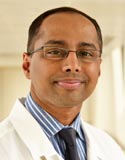
Maimonides Medical CenterIn serving the borough of Brooklyn’s residents, nearly half of whom are foreign born, cultural sensitivity and discretion are vital components of a physician’s practice. The Department of Medicine's clerkship site at Maimonides Medical Center offers third-year medical students the opportunity to provide comprehensive care to one of the country’s most culturally diverse group of patients, emphasizing the importance of compassionate patient care with attention to sociocultural and economic factors, as well as ethical issues in clinical decision making.
During the eleven-week internal medicine clerkship rotation, students encounter substantial pathophysiology ranging from the most common to the most exotic diseases seen in medicine. Nearly half of Brooklyn’s 2.5 million+ residents represent an ethnic minority; over a million ethnic Europeans from Italy, Ireland, Russia, Poland, Albania, and former Soviet Union countries call the borough home; and as of 2010 almost half of the borough’s population aged five and older spoke a mother language other than English.

Vijay S. Shetty, MB, BS"The clinical experience during this rotation is very hands on, and students learn first-hand what it takes to provide the best possible patient care using an evidence-based approach. We strive to understand and respect our patients’ diverse cultural needs and customs, and for our students to reflect that understanding as well," said Dr. Vijay Shetty, Deputy Assistant Dean, Director of Undergraduate Education, and site director for the Maimonides medicine clerkship.
Over the course of the clerkship, students directly interact with patients in the inpatient setting and participate in didactic programs, seminars, and teaching conferences. "Students are encouraged to take complete ownership of their patients, and the house staff and the faculty work closely with them to ensure that this happens," Dr. Shetty said.
Maimonides is one of Einstein’s newer affiliates—the institutions’ partnership began in 2010—and Dr. Shetty has been actively involved in teaching Einstein students since its inception. Completing his fellowship in cardiology that same year, he was the first site director for the Maimonides medicine clerkship, and a year later, he became site director for the medicine subinternship as well. In addition to overseeing all Einstein student-related activities across clinical departments, he is Director of the Cardiac Telemetry Unit and a consulting cardiologist at Maimonides, and Assistant Professor of Medicine (Cardiology) at Einstein.
After completing medical school and residency training in India, Dr. Shetty came to the U.S. in 2002 for a year of research at Weil Cornell Medical Center, followed by an internal medicine residency and cardiology fellowship at Maimonides. As a second-year resident, he founded the Physical Diagnosis Club, which serves to resurrect the dying art of the physical exam; years later, he continues to run this club, meeting with students and residents weekly to discuss challenging aspects of physical diagnosis.
Dr. Shetty is the author or co-author of more than thirty medical literature contributions, and has received many honors throughout his medical career, including Fellow Teacher of the Year and Teacher of the Year at Maimonides, and the Samuel M. Rosen Outstanding Teacher Award for excellence in clinical teaching at Einstein.
Students have reported positively on the Maimonides clerkship experience, with comments including:
- "The breadth of topics encountered on the rotation made it exceptionally interesting."
- "I really appreciated the independence on the floors as I was able to participate heavily in patient care."
- "It was great to be able to write daily progress notes in the electronic medical record as it made it easy for my attending and residents to look at my notes and give me feedback."
- "The attendings and residents love to teach and went out of the way to make sure my experience there was educational."
"We offer an opportunity for students to learn in an environment that encourages personal and professional growth and equips them to be strong residents in their chosen specialties," Dr. Shetty said.
The internal medicine clerkship rotation is conducted across seven sites in the Bronx and Long Island. This article is part of a series covering each training site, including the Montefiore Medical Center Wakefield Campus and Jacobi Medical Center.